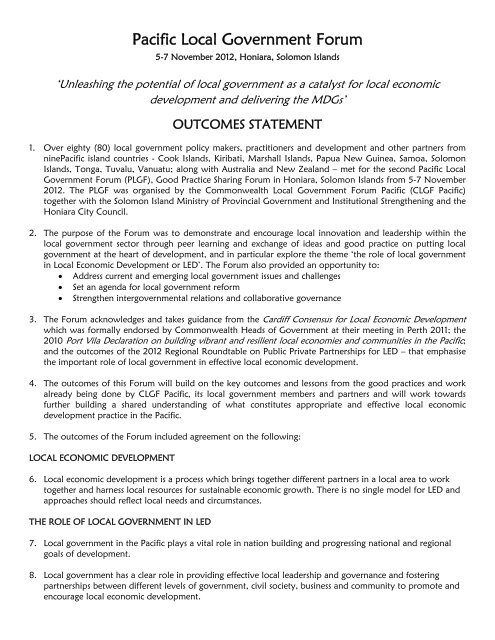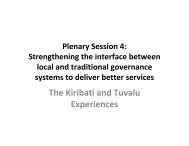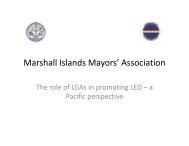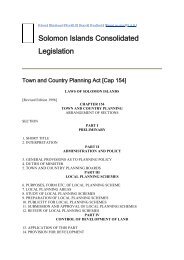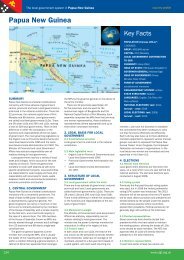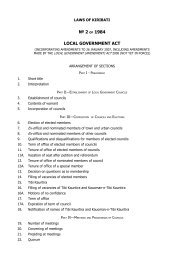PLGF 2012 Outcomes Document - CLGF - Commonwealth Local ...
PLGF 2012 Outcomes Document - CLGF - Commonwealth Local ...
PLGF 2012 Outcomes Document - CLGF - Commonwealth Local ...
You also want an ePaper? Increase the reach of your titles
YUMPU automatically turns print PDFs into web optimized ePapers that Google loves.
Pacific <strong>Local</strong> Government Forum<br />
5-7 November <strong>2012</strong>, Honiara, Solomon Islands<br />
‘Unleashing the potential of local government as a catalyst for local economic<br />
development and delivering the MDGs’<br />
OUTCOMES STATEMENT<br />
1. Over eighty (80) local government policy makers, practitioners and development and other partners from<br />
ninePacific island countries - Cook Islands, Kiribati, Marshall Islands, Papua New Guinea, Samoa, Solomon<br />
Islands, Tonga, Tuvalu, Vanuatu; along with Australia and New Zealand – met for the second Pacific <strong>Local</strong><br />
Government Forum (<strong>PLGF</strong>), Good Practice Sharing Forum in Honiara, Solomon Islands from 5-7 November<br />
<strong>2012</strong>. The <strong>PLGF</strong> was organised by the <strong>Commonwealth</strong> <strong>Local</strong> Government Forum Pacific (<strong>CLGF</strong> Pacific)<br />
together with the Solomon Island Ministry of Provincial Government and Institutional Strengthening and the<br />
Honiara City Council.<br />
2. The purpose of the Forum was to demonstrate and encourage local innovation and leadership within the<br />
local government sector through peer learning and exchange of ideas and good practice on putting local<br />
government at the heart of development, and in particular explore the theme ‘the role of local government<br />
in <strong>Local</strong> Economic Development or LED’. The Forum also provided an opportunity to:<br />
• Address current and emerging local government issues and challenges<br />
• Set an agenda for local government reform<br />
• Strengthen intergovernmental relations and collaborative governance<br />
3. The Forum acknowledges and takes guidance from the Cardiff Consensus for <strong>Local</strong> Economic Development<br />
which was formally endorsed by <strong>Commonwealth</strong> Heads of Government at their meeting in Perth 2011; the<br />
2010 Port Vila Declaration on building vibrant and resilient local economies and communities in the Pacific;<br />
and the outcomes of the <strong>2012</strong> Regional Roundtable on Public Private Partnerships for LED – that emphasise<br />
the important role of local government in effective local economic development.<br />
4. The outcomes of this Forum will build on the key outcomes and lessons from the good practices and work<br />
already being done by <strong>CLGF</strong> Pacific, its local government members and partners and will work towards<br />
further building a shared understanding of what constitutes appropriate and effective local economic<br />
development practice in the Pacific.<br />
5. The outcomes of the Forum included agreement on the following:<br />
LOCAL ECONOMIC DEVELOPMENT<br />
6. <strong>Local</strong> economic development is a process which brings together different partners in a local area to work<br />
together and harness local resources for sustainable economic growth. There is no single model for LED and<br />
approaches should reflect local needs and circumstances.<br />
THE ROLE OF LOCAL GOVERNMENT IN LED<br />
7. <strong>Local</strong> government in the Pacific plays a vital role in nation building and progressing national and regional<br />
goals of development.<br />
8. <strong>Local</strong> government has a clear role in providing effective local leadership and governance and fostering<br />
partnerships between different levels of government, civil society, business and community to promote and<br />
encourage local economic development.
9. Pro-poor, gender responsive and environmentally sound LED enables local governments to address poverty,<br />
urbanisation, unemployment, social marginalisation, climate change, environmental degradation and other<br />
critical service delivery challenges.<br />
10. Improving quality of life and community resilience are core goals of LED which directly contributes to the<br />
achievement of the Millennium Development Goals (MDGs) and shouldalso form a key component of the<br />
UN’s Post 2015 Development Agenda.<br />
Recognising the diversity of the local government sector and its environs, the need to ensure that local<br />
economic development strategies and activities are locally owned and reflect local needs and circumstances,<br />
we call on regional, national and local government leaders, the private sector, civil society and development<br />
partners to support and strengthen local governments role in local economic development to help reduce<br />
poverty and promote sustainable economic growth and prosperity across the Pacific:<br />
THE ROLE OF LOCAL GOVERNMENT ASSOCIATIONS IN PROMOTING LED<br />
11. <strong>Local</strong> government associations (LGAs) have a critical role as advocates for local government, particularly<br />
with national government, operationalising national frameworks and policy and assessing impact. They are<br />
important partners incapacity building, facilitating the exchange of good practice between local governments<br />
and their partners, and identifying and leveraging resources for LED.<br />
12. The establishment and strengthening of LGAs to play their role in promoting the role of local governments<br />
in LED should be prioritised.<br />
INNOVATIONS AND GOOD PRACTICES IN LED<br />
13. There are a wide range of case studies that already demonstrate the role of local government in LED as<br />
traditional service provider, regulator and catalyst for LED. These have highlighted the following:<br />
• The importance of strategic planning to provide a long-term vision for development and support and<br />
promote greater representation and participation in decision-making processes and resulting LED<br />
activities<br />
• Development of urban growth management plans are a essential tool for providing the conditions for<br />
investment<br />
• Provision of services and infrastructure are fundamental to capitalise on opportunities for economic<br />
development and in particular tourism<br />
• <strong>Local</strong> regulations and bylaws can have an important role in enabling economic growth and in particular<br />
women’s economic empowerment<br />
• Using simple sustainable building practices (such as white roofs) support economic growth by directly<br />
reducing costs to business and communities, as well as create other investment and employment<br />
opportunities<br />
• Effective waste management provides opportunities for changing community behaviour, job skills and<br />
innovation in economic activities<br />
• Creating employment opportunities and work experience for urban youthhelps to ensure social stability<br />
for longer term investments<br />
• ICT plays a role in improving the skills and revenue raising capacity of local governments<br />
• <strong>Local</strong> marketplaces are crucial for realising women’s development in the local economy and contribute<br />
to the alleviation of poverty. <strong>Local</strong> marketplaces also provide an opportunity to address underlying<br />
social issues including gender based violence, safety and security<br />
• <strong>Local</strong> governments can play a role in directly providing finance opportunities and information for small<br />
business development.
STRATGIES TO ENABLE LOCAL GOVERNMENT TO PLAY AN EFFECTIVE ROLE IN LED<br />
Establishing an effective policy framework for LED<br />
14. There is a need to improve the enabling environment for decentralization and local governance in the<br />
Pacific, with a focus on how this environment supports local government’s role in LED.<br />
15. Building the capacity of national government agencies (namely, ministries/departments responsible for local<br />
government) to harmonise policies and legislation, improve intergovernmental dialogue and coordinate<br />
programs in support of sustainable LED.<br />
Capacity building needs for local government in LED<br />
16. There is a critical need to build local leaders understanding of local government’s role as well as their own<br />
role as leaders in LED. There is also a need to building local government staff capacity on participatory<br />
community consultation and engagement methodologies to ensure effective involvement of key partners<br />
and stakeholders in LED activities.<br />
17. <strong>Local</strong> government capacity should be built to develop and implement direct community capacity support<br />
programs, information and services for small businesses.<br />
Partnerships to support LED<br />
18. Partnerships are at the heart of effective LED. Partnerships bring expertise, resources and capacity building<br />
opportunities, however the development of mutual trust and ownership is key to drive and establish<br />
sustainable long-term partnerships.<br />
19. The Good Practice Scheme/city partnership arrangements are a good practice that should be replicated<br />
across the Pacific as a key delivery mechanism for effective LED.<br />
20. Partnerships between national and local governments, national local government associations and<br />
development partners are critical. There is a need to increase funding and technical support to local<br />
governments if they are to achieve their LED roles and responsibilities.<br />
ICT and Knowledge Management for LED<br />
21. <strong>Local</strong> government should build on and strengthen existing mechanisms for sharing information and good<br />
practice.There is also a critical need to increasing local government access to ICT skills, tools and<br />
infrastructure.<br />
22. <strong>Local</strong> government ministries, national associations and regional organisations have a key role in facilitating<br />
sharing of ideas and LED good practice.<br />
23. ICT should also be used to provide opportunities for innovative community LED initiatives.<br />
DEMONSTRATION PROJECTS<br />
The following Demonstration Projects were workshopped on Day 3 of the roundtable. They will be developed<br />
and progressed with a view to creating sustainable and replicable Demonstration Projects in each of the areas<br />
listed. The learning’s will be incorporated into a guideline/toolkit to support local governmentand their<br />
stakeholders in developing and implementingstrategies for LED.<br />
• Women’s economic empowerment<br />
• Urban Youth Employment and Entrepreneurship<br />
• Outer Islands LED and climate change adaptation
• Sustainable Building Practices Guideline<br />
• Seasonal Worker Program<br />
• ICT Capacity Building and LED Knowledge Hub<br />
THE ROLE OF <strong>CLGF</strong> IN SUPPORTING AND PROMOTING LED<br />
24. The role of <strong>CLGF</strong> Pacific is to:<br />
• Build a shared understanding on what constitutes appropriate and effective LED practice in the region<br />
• Coordinate and provide capacity building support for local governments in LED<br />
• Facilitate a regional information and knowledge system for LED and other good practices<br />
• Leverage resources and partnerships to support local government LED initiatives<br />
25. Based on the outcomes of this Forum, <strong>CLGF</strong> will develop a multi-annual regional local government support<br />
program for LED working closely with existing and new development partners. It is expected that this will<br />
build on some initial pilot projects in early 2013 with a view to having a more substantive regional program<br />
developed and agreed before the end of 2013. In this work, <strong>CLGF</strong> will draw on similar programs in which it<br />
is involved in other parts of the <strong>Commonwealth</strong>, especially in the Caribbean, and to promote inter-regional<br />
learning and exchange of good practices.<br />
26. <strong>CLGF</strong> will take the outcomes of this Forum for further discussion within the management structures of <strong>CLGF</strong><br />
Pacific as well for showcasing the Pacific local government experience at the <strong>CLGF</strong> Conference<br />
‘Developmental <strong>Local</strong> Government: Putting <strong>Local</strong> Government at the Heart of Development’, Kampala,<br />
Uganda, 14-17 May 2013. It is noted that the outcomes of the 2013 Conference will be presented to the UN<br />
review on the post 2015 development agenda and to <strong>Commonwealth</strong> Heads of Government.<br />
ACKNOWLEDGEMENTS<br />
Sincere appreciation is expressed to the Forum hosts, the Solomon Islands Government, the Ministry of<br />
Provincial Government and Institutional Strengthening and the Honiara City Council for their generous support<br />
and hospitality.<br />
<strong>CLGF</strong> Pacific wishes to acknowledge the keynote addresses delivered by the Solomon Islands Prime Minister,<br />
Honourable Gordon Darcy Lilo. <strong>CLGF</strong> further wishes to acknowledge the addresses of the Lord Mayor of<br />
Honiara, Hon Andrew Mua; the <strong>CLGF</strong> Secretary General, Mr Carl Wright;the past <strong>CLGF</strong> Board Chair, Mr Basil<br />
Morrison; and the Premier of Guadalcanal Provincial Government, Mr Hon Anthony Veke. Representative from<br />
PIFS<br />
<strong>CLGF</strong> Pacific acknowledges the support of the New Zealand Aid Programme, the Australian Agency for<br />
InternationalDevelopment (AusAID) Pacific Leadership Program for providing sponsorship for the Forum.<br />
<strong>CLGF</strong> also thanks participating partners and development agencies<strong>Local</strong> Government Managers Australian<br />
(LGMA) and <strong>Local</strong> Government New Zealand (LGNZ), International Women’s Development Agency (IWDA),<br />
<strong>Commonwealth</strong> Pacific Governance Facility, <strong>Commonwealth</strong> Youth Programme, European Union (EU), United<br />
Nations Capital Development Fund (UNCDF),United National Development Programme Honiara (UNDP),<br />
United Nations Entity for Gender Equality and the Empowerment of Women (UN Women),the World Bank,<br />
University of the South Pacific (USP), the Australian Major Cities Unit and Australian Department of Education,<br />
Employment and Workplace Relations (Seasonal Workers Program).


